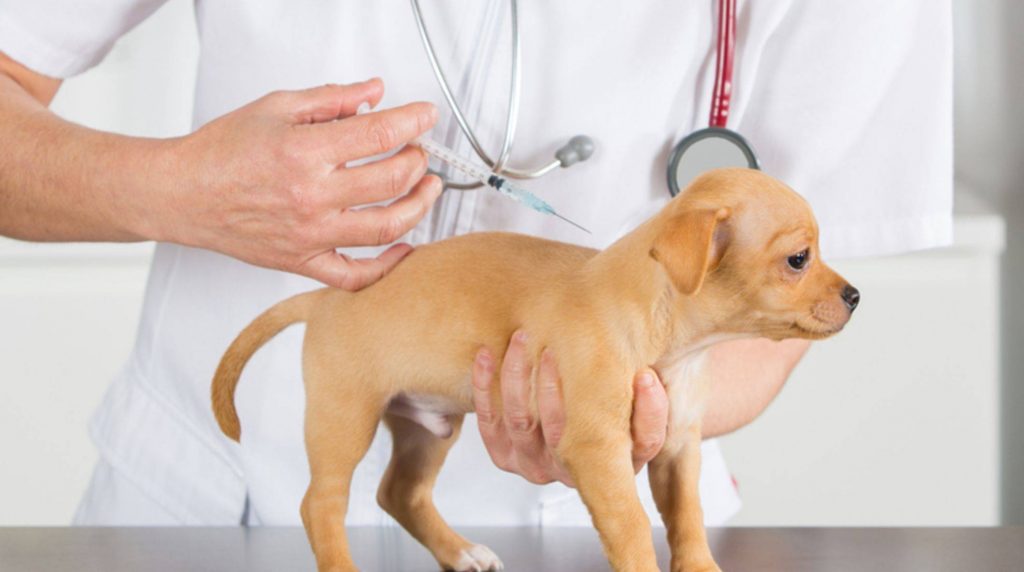The topic of vaccinations for dogs always causes different opinions and criticism. Here you can find out which immunizations make sense and which ones you and your four-legged friend can do without.

First of all, puppies should receive basic vaccinations. Then there are various vaccinations for the dog, which can also be useful – and which ones you can usually do without. If you are unsure, ask your veterinarian for his opinion.
Distemper, hepatitis, parvovirus: These vaccinations are useful for dogs
At 8 to 10 weeks of age, puppies should have a
get basic immunization. Useful vaccinations are against:
● Distemper
● Hepatitis
● Parvovirus
These vaccinations for dogs are usually administered as a combined preparation and noted on the vaccination card with “SHP”. Your four-legged friend will be vaccinated against distemper, hepatitis and parvovirus for several years after completing the basic immunization. The SHP vaccination has to be refreshed three times for this to work.
The first refresher takes place around the 12th week of life, and the second refresher in the 16th week of life. In total, your young dog will receive three injections at intervals of three to four weeks in the first few weeks of life; then, it will be protected against the diseases for the time being. However, the basic immunization is not properly completed until the third booster at 15 months.
Why vaccinations are important in puppyhood
In the first few weeks of life, puppies are usually protected against diseases by the antibodies they got from their mother. However, it is impossible to determine how good innate immune protection is. Some puppies get a lot of antibodies and have a naturally robust immune system, while others are more susceptible to illness. The so-called maternal antibodies lose their effect between the 8th and 16th week of life, so an additional vaccination to protect against distemper, hepatitis, and parvovirus is useful.
The problem with this: The SHP vaccinations consist of live vaccines that have been rendered harmless. However, the maternal antibodies do not know this and fight the vaccines like real pathogens. The more maternal antibodies a puppy has, the more difficult it is to build up its vaccination protection before the 16th week of life.
Only when the mother’s antibodies lose their effect can the vaccine stimulate the body’s immune system to produce its antibodies. So that puppies are completely protected against pathogens, they have to be vaccinated three times to be on the safe side. Whether maternal antibodies or vaccine-related antibodies fight off the distemper, hepatitis and parvovirus pathogens are of secondary importance.
How often do dogs need booster vaccinations?
After the basic immunization, it can be useful to refresh the SHP vaccinations for the dog. How often the refresher has to be done is controversial among experts. Some veterinarians believe that the vaccination must be renewed every year to ensure protection. However, this is now considered obsolete.
This recommendation dates back to when inactivated vaccines were used to vaccinate against distemper, hepatitis and parvovirus. The vaccination protection decreases after about a year. Nowadays, it is sufficient to have your dog revaccinated about every three years. Some veterinarians are even of the opinion that basic immunization is adequate. But if that’s too risky for you, it’s better to stick to the three-year interval.
Does your dog need a rabies vaccination?
A special case is a vaccination against rabies. In Germany, the terrible disease has been eradicated since 2008. However, if you are planning a holiday with a dog, you should find out about the laws in your travel country because some states require valid rabies vaccination for entry.
There is a small residual risk for dogs to contract rabies in Germany from dogs imported from abroad, where the disease has not yet been eradicated. This applies, for example, to too many countries in Eastern Europe, Africa and parts of South America. If you decide to get a rabies vaccination, ensure that the vaccine remains effective for three years.
Vaccinations for the dog against kennel cough: does it help?
Other dog vaccinations are controversial, and ideally, you should check with your vet to see if your four-legged friend would benefit from them. This includes immunization against kennel cough. The disease is similar to a cold and can be triggered by many different pathogens. It is, therefore, currently not possible to protect against kennel cough with a vaccine. In addition, kennel cough is easy to treat and cure.
Nevertheless, it can be useful to vaccinate your dog against it in special cases. For example, if he is generally weakened by a chronic illness or old age, infection with kennel cough would be dangerous. Vaccination can then at least reduce the risk of disease.
Discuss leptospirosis vaccination for dogs with the veterinarian
The leptospirosis vaccine is made from whole bacteria. Therefore, the risk of side effects from this vaccination is quite high. Caution should be exercised, especially with small dog breeds. In addition, there are many different types of bacteria called Leptospira, and modern fabrics only protect against about four of them.
Nevertheless, we cannot categorically advise against leptospirosis vaccination. If your dog plays a lot outside in standing water or comes into contact with the urine of mice and rats in the garden, he is at risk of infection. With vaccination, you can still increase protection against leptospirosis, although you cannot completely prevent your dog from becoming infected.








